

Drain the Ocean. Hot Planet. Professors Iain Stewart and Professor Kathy Sykes take a timely look at global warming ahead of the Copenhagen summit, exploring the world's leading climate scientists' vision of the planet's future.
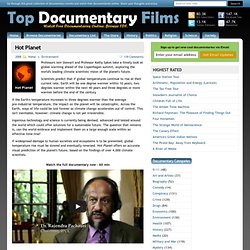
Scientists predict that if global temperatures continue to rise at their current rate, Earth will be one degree warmer within 10 years, two degrees warmer within the next 40 years and three degrees or more warmer before the end of the century. If the Earth's temperature increases to three degrees warmer than the average pre-industrial temperature, the impact on the planet will be catastrophic.
Across the Earth, ways of life could be lost forever as climate change accelerates out of control. This isn't inevitable, however: climate change is not yet irreversible. Ingenious technology and science is currently being devised, advanced and tested around the world which could offer solutions for a sustainable future. Mysterious Origins of Man. This documentary presents ancient artifacts that contradict the official historical perspective that mankind has advanced scientifically since the beginning of human history.
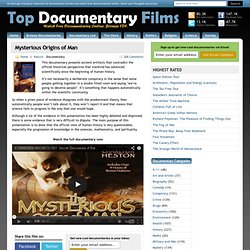
It’s not necessarily a deliberate conspiracy in the sense that some people getting together in a smoke filled room and saying "we’re going to deceive people". It’s something that happens automatically within the scientific community. So when a given piece of evidence disagrees with the predominant theory, then automatically people won’t talk about it, they won’t report it and that means that science fails to progress in the way that one would hope. Man vs. Wild. With little more than the clothes on his back, survival expert Bear Grylls goes toe-to-toe with some of Earth's toughest, most remote environments in each edge-of-your-seat episode of MAN VS. WILD. Grylls faces sweltering desert temperatures, icy, raging rivers and hungry predators as he fights for survival using techniques he learned as a British Special Forces soldier.
You'll never look at the great outdoors the same way again! The Rockies: In this episode, Grylls encounters a grizzly bear, jumps off a 70-foot cliff and floats nearly 12 miles in treacherous and freezing white water, all on a diet of rattlesnake, raw fish and worms. European Alps: Armed with just a knife, water bottle, cup and a flint to make fire, Grylls parachutes into this mountain range. Costa Rican Rainforest: Grylls's challenge is to make his way to civilization from within the Costa Rican rainforest with just a knife and a water bottle.
This documentary is available for preview only. Great Natural Wonders of the World. Earth 100 Million Years From Now. The Gulf Stream and The Next Ice Age. The Gulf Stream and The Next Ice Age is about the consequences of global warming on The Great Atlantic Conveyor, which has to do with regulating climate and the fear that the melting of ice will stop it, perhaps triggering an ice age.
In the battle against climate change there is no enemy to fight, just our attitudes. - Nicolas Koutsikas, Director. Climate Change is hot on the political and social agenda internationally. Our climate is changing, with industrial production, habitat, transport and everyday human activities acknowledged as causes of global warming. BBC iPlayer - Frozen Planet: To the Ends of the Earth. BBC iPlayer - Frozen Planet: Spring. BBC iPlayer - Frozen Planet: Summer. Planet Earth: The Complete BBC Series. Supervolcano. The beauty of America's Yellowstone National Park masks one of the rarest and most destructive forces on Earth - a supervolcano.
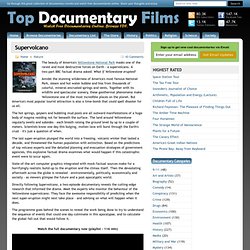
A two-part BBC factual drama asked: What if Yellowstone erupted? Amidst the stunning wilderness of America's most famous National Park, steam and hot water bubble and hiss from thousands of colorful, mineral-encrusted springs and vents. Together with its wildlife and spectacular scenery, these geothermal phenomena make Yellowstone one of the most incredible places on the planet.
But America's most popular tourist attraction is also a time-bomb that could spell disaster for us all. Owning the Weather. How Earth Made Us. The incredible story of the natural forces that have shaped our history presented by Professor Iain Stewart.
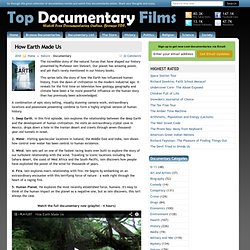
Our planet has amazing power, and yet that's rarely mentioned in our history books. Earth Story. Inside Planet Earth. How the Earth Was Made: Season 2. This season, How the Earth Was Made goes back in history from 4.5 billion years ago to today peeling back layers of rock, filling up river canyons, parting the oceans, and leveling mountains and volcanoes to investigate the origins of some of the most well-known locations and geological phenomena in the world.
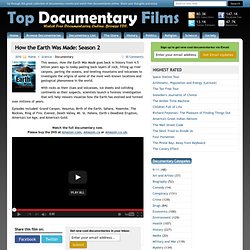
With rocks as their clues and volcanoes, ice sheets and colliding continents as their suspects, scientists launch a forensic investigation that will help viewers visualize how the Earth has evolved and formed over millions of years. Episodes included: Grand Canyon, Vesuvius, Birth of the Earth, Sahara, Yosemite, The Rockies, Ring of Fire, Everest, Death Valley, Mt. St. The Core. For centuries we have dreamt of reaching the center of the Earth. Now scientists are uncovering a bizarre and alien world that lies 4,000 miles beneath our feet, unlike anything we know on the surface. It is a planet buried within the planet we know, where storms rage within a sea of white-hot metal and a giant forest of crystals make up a metal core the size of the Moon. Horizon follows scientists who are conducting experiments to recreate this core within their own laboratories, with surprising results.
This documentary is available for preview only. Try to get it at Amazon.com, Amazon.ca or Amazon.co.uk. Richard Hammond’s Journey To The Centre of the Planet. Birth of the Earth. Our Earth was spinning very fast when it was spit out of the Sun as a molten glob four and one half billion years ago in the initial explosion.
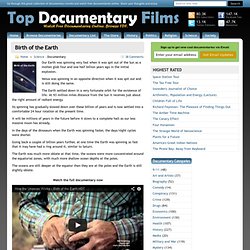
Venus was spinning in an opposite direction when it was spit out and is still doing the same. The Earth settled down in a very fortunate orbit for the existence of life. At 93 million miles distance from the Sun it receives just about the right amount of radiant energy. Its spinning has gradually slowed down over these billion of years and is now settled into a comfortable 24 hour rotation at the present time. It will be millions of years in the future before it slows to a complete halt as our less massive moon has already.
Earth: Making of a Planet. The Living Planet.